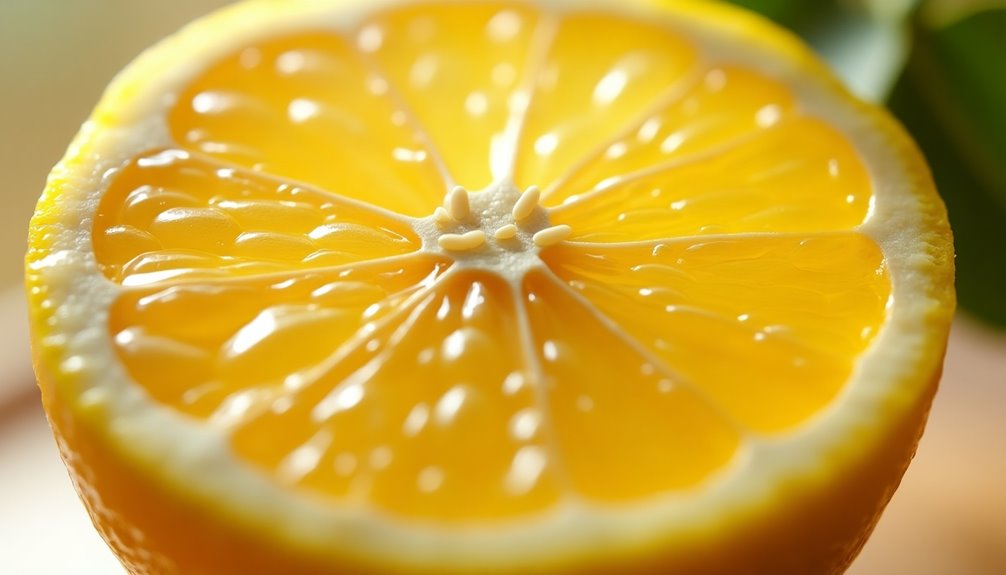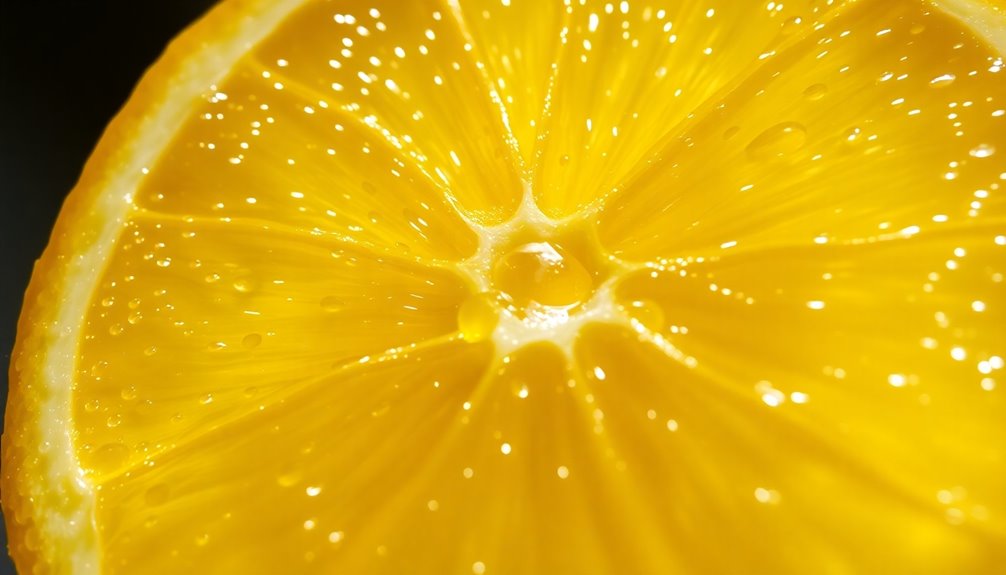When you cut a lemon in half, a medium lemon typically yields about 1½ to 2 tablespoons of juice. If you're using a large lemon, expect around 2 tablespoons, while a small lemon gives you about 1 tablespoon. The amount can vary based on the lemon's size and ripeness, so it's handy to know this for your recipes. Stick around to learn more about maximizing your lemon juice output and planning your cooking needs.
Key Takeaways
- A medium lemon yields about 1½ to 2 tablespoons of juice from half.
- A large lemon typically provides approximately 2 tablespoons of juice from half.
- A small lemon yields around 1 tablespoon of juice when cut in half.
- Juice yield can vary based on the lemon's size and ripeness.
- Having extra lemons on hand ensures you have enough juice for recipes.

When you’re squeezing half a medium lemon, you can expect to get about 1½ to 2 tablespoons of juice. This amount is usually sufficient for many recipes, whether you’re whipping up a salad dressing, marinading chicken, or adding a zesty kick to your favorite dessert. When determining how much juice is in half a lemon, it’s helpful to keep in mind that the exact amount can vary based on the lemon’s size and juiciness. If you find yourself needing more juice for your dish, simply adjust by using a whole lemon or adding a splash of bottled lemon juice. This versatility makes lemon a staple ingredient in countless culinary creations, enhancing flavors and brightening dishes with its vibrant acidity.
Understanding the juice yield from various lemon sizes helps you plan better, especially when you're in the middle of cooking. If you're using a large lemon, you might be pleasantly surprised to find that half of it can produce approximately 2 tablespoons of juice. This extra juice can be a game-changer, allowing you to enhance flavors without needing to squeeze multiple lemons.
On the flip side, if you're working with a small lemon, don't expect as much. Half of a small lemon may yield around 1 tablespoon of juice, which mightn't be enough if your recipe calls for a whole lemon. Knowing these variations can save you time and hassle in the kitchen.
One thing to keep in mind is that the actual juice yield can vary based on factors like the lemon's ripeness and its specific variety. A perfectly ripe lemon will generally give you more juice than one that's overripe or underripe.
So, always give your lemons a gentle squeeze before buying them; they should feel firm yet slightly yielding. This way, you can ensure you're getting the best juice yield possible. It's also a good idea to have extra lemons on hand whenever you're preparing a dish that requires lemon juice.
Many recipes call for the juice of a whole lemon, meaning you'll need to squeeze both halves to get the desired amount. If you only have one lemon and it turns out to be on the smaller side, you might find yourself short on juice. Having a few extra lemons in your kitchen can prevent that last-minute dash to the store and keep your cooking process smooth and enjoyable.
When you're planning your recipes, remember that not all lemons are created equal. Whether you're using a medium lemon, a large lemon, or a small lemon, each will have a different juice yield that can impact your dish.
If you often find yourself using lemon juice, consider keeping a variety of lemons available. This way, you can choose the right size for your needs, ensuring you extract the perfect amount of juice every time.
Frequently Asked Questions
Can I Substitute Bottled Lemon Juice for Fresh Lemon Juice?
You can substitute bottled lemon juice for fresh lemon juice in a pinch, but it mightn't deliver the same bright flavor.
Bottled juice often contains preservatives and can taste different from fresh. If your recipe relies heavily on lemon's vibrant taste, you're better off using fresh juice.
While some people find bottled juice acceptable, you'll likely notice a significant difference in taste and freshness when you use freshly squeezed lemons.
How Much of Bottled Lemon Juice Is Equal to 1 Lemon?
Ever wondered how much bottled lemon juice equals one fresh lemon?
Generally, one medium lemon yields about 3 tablespoons of juice. So, if you're using bottled lemon juice, about 2 tablespoons should match the flavor.
Keep in mind, though, that fresh lemon juice often has a brighter taste.
If you're in a pinch, though, using bottled juice can save time while still adding that zesty kick to your dishes.
How Many Mls Are in Half a Lemon?
When you squeeze half a lemon, you can expect to get about 22 to 30 milliliters of juice.
The exact amount can vary based on the lemon's size and ripeness, so keep that in mind. To measure accurately, use a measuring spoon or a small liquid measuring cup.
Freshly squeezed juice is always the best option, as it offers a brighter flavor than bottled alternatives.
Enjoy your cooking and cocktails with that zing!
How Much Lemon Juice Is a Squeeze?
When you squeeze a lemon, you typically get about 1 to 2 teaspoons of juice per squeeze, depending on the lemon's size and ripeness.
If you apply more pressure or use a citrus juicer, you might extract a bit more.
Keep in mind that fresh lemons yield more juice than older ones, so always choose the freshest fruit for the best results in your cooking or cocktails!
Conclusion
So, if you're ever in a pinch and need to know how much juice is in half a lemon, remember, it's about 1 to 1.5 tablespoons. But let's be real—who's actually measuring? In a world where we obsess over the perfect avocado toast, why not just squeeze the whole fruit and call it a day? After all, life's too short to fret over citrus measurements. Embrace the chaos, and let your culinary instincts guide you—or just grab a bottle of lemon juice!
Cindy thoroughly researches juicing trends, techniques, and recipes to provide readers with practical advice and inspiration. Her writing style is accessible, engaging, and designed to make complex concepts easy to understand. Cindy’s dedication to promoting the advantages of juicing shines through her work, empowering readers to make positive changes in their lives through the simple act of juicing.

















